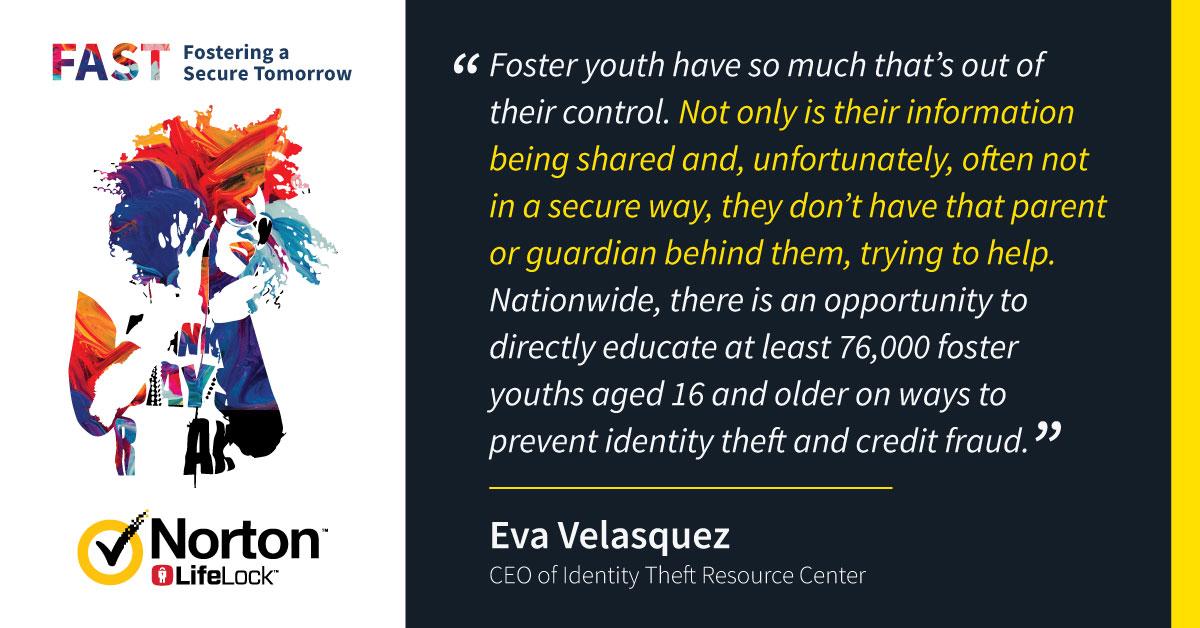Identity Theft Can Last a Lifetime
Symantec won’t let foster youth face identity theft alone

Originally published on Symantec Blog | Corporate Responsibility
By Tess Hetzel, Corporate Responsibility Manager
There is a new victim of identity theft every two seconds. With an email address, birth date and home address, criminals can open credit cards in your name, rack up medical bills for services you never received, or claim wages you didn’t earn. Identity theft can be a challenging crime to recover from in the best of circumstances – say, as an adult with the time, experience, and resources to do what needs to be done.
Now imagine dealing with identity theft while in foster care – destroyed credit that prevents you from leasing an apartment, being able to secure a job, or securing financial aid for college once you age out of the system. Foster youth are incredibly vulnerable to identity theft as they move from one home to another and an expanding group of individuals gain access to their private information.
Symantec is uniquely equipped, with our Norton and LifeLock consumer solutions and services, to help these youth people. As a world-leading cyber security organization, we can provide not only the security software, but the educational training and restoration services to help these young people learn to better protect their information and restore their identities when necessary.
We launched the Fostering a Secure Tomorrow (FAST) initiative in 2018 to help foster youth protect and restore their identities through education, solutions, and identity restoration services.
One year into the initiative, we’ve provided free in-person training and workshops, as well as webinars and online resources to help change behaviors that make foster youth vulnerable. Given the lack of data on foster youth and identity theft, we also partnered with The Identity Theft Resource Center and conducted a survey to better understand identity theft’s impact on foster youth who are 14 and older. Results of this survey can be found in the 2018 trend analysis: The Impact of Identity Theft on Foster Youth.
A focus on public policy
As we leave the pilot phase of the program and begin phase 1, one of the major themes for FAST is working with legislators on public policy that protects foster youth. Government agencies have a lot of oversight on how children in foster care spend their days and what information they have access to. For instance, foster youth in many states attend mandatory learning sessions (called ILP, Independent Living Programs) where they are taught important life skills – balancing a checkbook, cooking a meal, learning how to search for a job.
We feel strongly that cyber safety is also a vital skill for foster youth to learn – how to create a strong password, how to run a credit check, and why they shouldn’t post a picture of their new drivers license on Instagram. Since state or local governments are in charge of so much of the youths’ lives, we’re working with government agencies to incorporate cyber safety into the work they already do.
Here are a few things we’ve done to raise awareness and make an impact so far in Phase 1 of the program:
- AmeriCorps trainings. Symantec’s Chief of Identity Education Paige Hanson is joining me to train iFoster AmeriCorps members that work directly with foster youth on cyber safety and identity protection.
- Meetings on Capitol Hill. I met with members of the Financial Services Committee on the Hill in April. Eva Velasquez from Identity Theft Resource Center joined me to discuss findings from our 2018 trend analysis on the impact of identity theft on foster youth. Members of the committee learned a lot about foster youth in general as well as the unique risks they face when it comes to identity protection and cyber safety.
- Supporting CASA. CASA (Court Appointed Special Advocates) volunteers advocate for foster youth who have experienced abuse or neglect. Symantec is a Contributing Sponsor of The 2019 National CASA Conference, which brings together staff of direct service organizations, social workers, judges and lawyers, and corporate leaders who are committed to building stronger families to achieve better outcomes for children.
- California legislative shadow day. Ashley Savageau, Symantec’s Community Relations Manager was in Sacramento, CA earlier this week. She led a one-hour cyber safety and identity protection FAST training for 30 foster youth and nonprofit staff. Symantec also hosted a dinner for participating youth and nonprofit staff, after the training and Ashley met with fivelegislative staff to discuss the importance of policy that supports cyber safety initiatives for foster youth.
- Spreading the word. Symantec’s CR team is also sending an email to all members of the California assembly democratic caucus, including information on the FAST program, sample social media messages to enable them to help us promote this important work, and provided resources for their constituents and foster youth in their districts.
Symantec’s FAST initiative will continue to provide cyber security education and trainings and access to Norton security products and LifeLock identity restoration services directly to foster youth. And, we know that we need to do even more to help keep this vulnerable population safe. We’re working to spread our impact by educating and empowering others who have existing relationships with foster youth and will continue to advocate for strong policies that help protect foster children.
For more information on FAST please visit go.symantec.com/FAST or email CR@symantec.com

